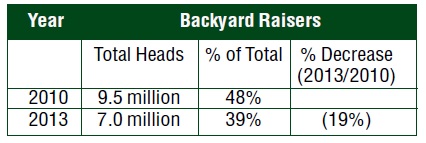“The DA is not serious about smuggling,” said a backyard hog raiser last week. The Department of Agriculture (DA) is now taking some action to address this issue but it is not enough.
When Agriculture Secretary Proceso Alcala made a commitment in 2010 to fight smuggling, we thought his subordinates would give him full backing. Some did, but most did not. One senior DA official even said: “Smuggling is not our job. That is the work of the Bureau of Customs (BOC), not the DA.”
But if the DA is responsible for improving farmer and fisherfolk welfare, and if smuggling is destroying their livelihood, fighting smuggling is also the DA’s job. Let us look at just one sector of agriculture.
Take the case of the swine industry. It is estimated that 37,882 metric tons are smuggled in one year alone. Unfortunately, it is the small backyard raisers that suffer the brunt of the pain. Consider the table below:
From 2010 to 2013, instead of an increase, there was a 19-percent decline in the production of small backyard raisers.
Below are a few examples of the DA’s inadequate anti-smuggling action:
During the Feb. 10, 2011 Agriculture and Fisheries 2025 Conference, 200 farmer, fisherfolk and agribusiness leaders identified smuggling as a key issue that the DA should address. Three years and nine months later, there is still no designated focal person in the DA to combat smuggling. There is also no DA Anti-smuggling Team that we were informed would be created. Contrast this with the DTI. It has a Bureau of Import Services with a full-time staff of more than 25 people, where fighting smuggling is a key priority.
Much smuggling is done through undervaluation. We commend director Rubina Cresencio of the Bureau of Animal Industry and director Minda Manantan of the National Meat Inspection Services for their efforts in this area. However, a key solution that the Alyansa Agrikultura recommended is for the DA to become an official member of the BOC’s Valuation Review and Classification Committee, which is the status the DTI has. However, the DA has not taken any step to do this. Thus, while industrial valuation interests are properly addressed in this committee, agriculture interests are sacrificed because of the DA’s inaction.
After a struggle for more than 10 years, the Inward Foreign Manifest (IFM) was given simultaneously to the DA and the DTI last July. The IFM is a list containing the details of the products imported, the name of the ship and the date of arrival. It is given at least 24 hours before the actual arrival. Thus, smuggled products can be confiscated immediately upon arrival.
The private sector led the initiative to ensure that this list goes simultaneously to the BOC, DTI, and DA. This will prevent the BOC from altering this list before sending it to the DA and DTI, as what happened in the past. Upon receiving the IFM, the DTI immediately used this information to identify smuggled goods. But for the DA, it took another four months to start systematically using the IFM. Up to now, it is still finalizing procedures on how to best use this important tool to fight smuggling. Ironically, it was the agriculture sector, not the industrial sector, that led this successful initiative for IFM access. It is the industrial sector that is currently taking full advantage of this.
At the monthly government-private National Competitiveness Council (NCC) Anti-smuggling Committee meetings, senior government officials of different agencies participate actively. But while the DTI is represented by a DTI director, DA is represented regularly by a person with less than a division chief rank. Therefore, while the DTI anti-smuggling action is implemented immediately and reported upon comprehensively at the subsequent monthly meeting, the DA can rarely report such action. This is because the DA representative is at too low a level to achieve this. Thus, while anti-smuggling actions succeed in the DTI, they usually get few results in the DA.
Back-up needed
Secretary Alcala’s commitment to fight smuggling is clear. Some DA officials like Cresencio and Manantan have admirably given reality to this commitment. But other DA officials do not give Alcala the necessary back-up to fight smuggling. Thus, the smuggling problem continues to harm our agriculture development and discourages much needed agricultural investment. Most importantly, it results in the opposite of inclusive growth by depriving our farmers and fisherfolk the livelihood they need to get out of poverty. It is time for these erring officials to provide Alcala the necessary support to reverse this disastrous trend of increasing smuggling cases.
(The author is chair of Agriwatch, former Secretary for Presidential Flagship Programs and Projects, and former Undersecretary for Agriculture, Trade and Industry. For inquiries and suggestions, e-mail agriwatch_phil@yahoo.com or telefax (02) 8522112).


